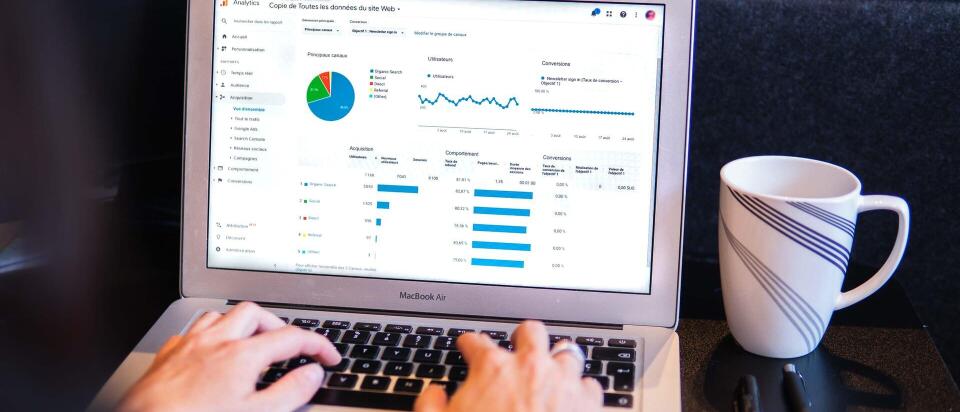
With virtual events, you have access to more data than ever before, from which you can draw valuable conclusions about your target audience and their needs. Not sure where to start? We'll walk you through the entire process step-by-step, revealing how to properly collect, evaluate, and ultimately use data to make future events even more successful.
Step 1: Collect the right data
Today, it's easier than ever to collect data. Whether it's through your guest management system, your event management software, mobile apps, social media channels, engagement tools, surveys during the event, or feedback forms afterwards, the mass of data analysis possibilities is gigantic. Filtering out from this mass which of these data are actually valuable in order to draw conclusions for future events can be a challenge. Therefore, it is essential that you first select and organize the available data before you process it further.
1. What data do you have?
Create an overview of all data that is already collected - preferably before the event.
Which tools and platforms do you use and which data is automatically collected? Do you have additional data collection options, e.g. through surveys, integration of other tools, etc.?
What data do you and your team collect manually, e.g. through post-event feedback questionnaires?
Which data from previous events do you have access to? In what form is it available? Collect all the data you can find online and offline and organize them in a list.
2. What data do you need?
Which of these data are relevant for you or whether you need additional data depends on the one hand on your specific event and its course, but on the other hand also on the goal you are pursuing with the data collection. Normally, there are two primary goals with which event data is collected: first, to adjust your event strategy and make future events even better; second, to report internally on the success of a goal, for example to partners, bosses, sponsors, and so on. Both, of course, require different data. For the former, it may be interesting to know which marketing channels were particularly successful or which speakers your attendees perceived as particularly relevant; for the latter, cost-benefit calculations or the impact of certain sponsors, for example, are important metrics. So think carefully in advance about what data you need and how you can obtain it, or whether the data you already collect by default is sufficient for this, or whether you can obtain more data relevant to you, for example, by using feedback questionnaires or switching to another event management software.
3. How to collect the right data
You can usually access the following four data sources to collect relevant data. Ask yourself in advance how you can best use them to collect data relevant to your event. If it helps you, you can also set up theses for this, e.g. "Target group x will be particularly interested in topic y because...", which you can check using the data after the event. However, be sure to maintain a certain flexibility in order to be able to react to unexpected data.
Data Sources
Here are the most common data sources.
Data source 1: Your guest management system
For both on-site and virtual events, a guest management system helps you with all email communications around the event, such as invitations, reminders, etc., as well as everything related to check-in. In doing so, it gathers exciting insights on email open rates, registrations, shows and no-shows, returning attendees, etc. For virtual or hybrid events, it's usually integrated with the event management software, but for on-site events, you can use it separately.
Data source 2: Your event management software
Virtual events have the great advantage that a lot of data is already collected automatically. Event management software in particular plays a more important role than ever before. To a certain extent, they are your digital event location, interface, planning and communication tool in one. Where at an on-site event you have to count all the participants of a talk individually, the event management software shows you at a glance how many people took part, who left early, how many participants listened to the rest and who contributed in terms of content. How many were repeat attendees? Are there groups for whom a particular talk was particularly interesting or uninteresting? Your event management software collects all this information during the event and evaluates it for you. Make sure you book an event management software where you have a personal contact person you can turn to if you have questions about the data. That way, you can take full advantage of the potential of your data.
Data source 3: Feedback from your participants
Much of what you need to know about your event can be deduced from how your participants behave during it - but not everything. Therefore, take the opportunity and get into conversation with your participants. Even during the event, you can send them targeted feedback surveys, and even after the event, be sure to ask your guests for feedback, ideas, suggestions for improvement, and so on. Especially if questions remain unanswered on the basis of the collected data, you can draw valuable knowledge from it. Here, too, your event management software can support you.
Data source 4: Your subjective perception of the event
Don't just ask the guests for their impressions. You and your team will certainly have gathered interesting insights during the event about what went well and where there is still room for improvement, about which topics the participants were particularly involved in (perhaps not only quantitatively, but also qualitatively), and so on. Sit down promptly, that is, no more than a week after the event, while your memories are still present. You can also develop your own feedback questionnaire for your team, to be filled out by everyone after the event.
Step 2: Evaluate the collected data properly
At least as important as collecting the data is evaluating it. If you leave your data lying around unused, you use up valuable resources and, of course, also the chance to draw important conclusions from them about your target group and their needs and wishes.
If possible, ask yourself specific questions for the evaluation and try to answer them using the data. For example, if you find that your event made more money than the same event the year before, you can use the data to reconstruct why: Maybe your expenses went down due to cheaper service providers, maybe you changed your marketing strategy, maybe one of your sponsors brought in new contacts who also became customers? Any information you can pull from the data in this step will give you valuable insights that you can use for future events. You may also have formulated theses in advance that you can now test. Where are there similarities, where are there discrepancies? If you notice in the evaluation process that you are missing data, you can also send the participants a feedback questionnaire after the event that asks specifically for this information, e.g. by establishing a link between what the participants particularly liked about your event and whether they became buyers afterwards. Involve also your own perception of the event and trust your intuition. The closer the evaluation process is to the event, the better.
Step 3: Use the collected, evaluated data for planning future events
You can then use the collected, evaluated data to adapt your event strategy for future events. The best thing to do is to discuss the results in the team immediately after the evaluation and collect ideas together on how you can make future events even better on the basis of this.
Questions you can ask yourself in the team include:
What went well?
Where is there a need for optimization?
Which speakers or topics were well received, which less so? Why?
What new things did you learn about your target group and their interests from the data? - Which marketing channels worked particularly well, which not so much? Why
What is the cost-benefit ratio for the various measures?
For the development and adaptation of future events, it is a good idea to take another look at your corporate philosophy as a team. Ask yourself, for example:
For the development and adaptation of future events, it is a good idea to take another look at your corporate philosophy as a team. Ask yourself, for example:
Did the event help you pursue your corporate mission? To what extent? Which aspects are or were particularly relevant? Which less so?
Did the event meet the needs of your target group(s)? Why or why not? For what reasons did your participants take part in the event? What would they miss if the event had not taken place or would not take place again?
What clear goals can you formulate for future events on the basis of this?
Ideally, you should distribute the questions among the team before the meeting. That way, everyone has time to think about them in advance, can review the event at their leisure, and come to the meeting prepared.
Conclusion
Especially with virtual events, you have access to more data than ever before, from which you can draw valuable conclusions about your target group and their needs. In order to evaluate and use the data in the best possible way, you can ask yourself the following questions:
Before the event:
What data do I have access to?
What do I expect from the event? What goals have I formulated? What actions have I taken to achieve them? How do I think this will show up in the data?
Is the data I collect sufficient for this, or do I need to collect more data?
During the event:
How do I perceive the event? What do I think goes well, what not so much?
Which topics seem to be particularly relevant for my target group? Why?
After the event:
Have the expectations I formulated in advance been confirmed?
Do my observations during the event match the data collected?
Where are there inconsistencies or deviations in the data? How can these be explained?
What new things do I learn about my target group and their needs from the data?
How can I use the lessons learned for future events?
